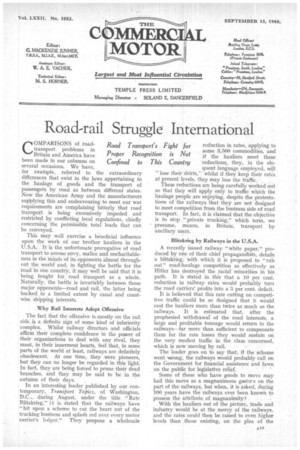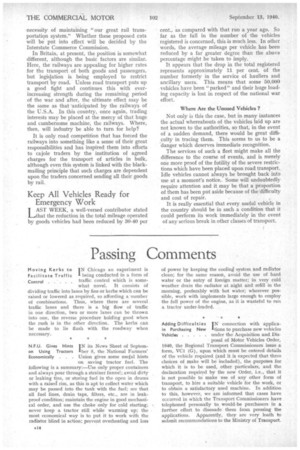Road-rail Struggle International
Page 15

Page 16

If you've noticed an error in this article please click here to report it so we can fix it.
COMPARISONS of roadtransport problems in Britain and America have been made in our columns on several occasions. We have, for example, referred to the extraordinary differences that exist in the laws appertaining to the haulage of goods and the transport of passengers by road as between different states. Now the American Army and the manufacturers supplying this and endeavouring to meet our war requirements are complaining bitterly that road transport is being excessively impeded and restricted by conflicting local regulations, chiefly concerning the permissible total loads that can be conveyed.
This may well exercise a beneficial influence upon the work of our brother hauliers in the U.S.A. It is the unfortunate prerogative of road transport to arouse envy, malice and uncharitableness in the minds of its opponents almost throughout the world and, in fighting the battle for the road in one country, it may well be said that it is being fought for road transport as a whole. Naturally, the battle is invariably between those major opponents—road and rail, the latter being backed to a limited extent by canal and coastwise shipping interests.
Why Rail Interests Adopt Offensive The fact that the offensive is mostly on the rail side is a definite sign of some kind of inferiority complex. Whilst railway directors and officials affirm their complete confidence in the pcoever of their organizations to deal with any rival, they must, in their innermost hearts, feel that, in some parts of the world at least, railways are definitely obsolescent. At one time, they were pioneers, but they can no longer be regarded in this light. In fact, they are being forced to prune their dead branches, and they may be said to be in the autumn of their days.
In an interesting leader published by our contemporary, Transport Topics, of Washington, D.C., during August, under the title "Rate Blitzkrieg," it is stated that the railways have "hit upon a scheme to cut the heart out of the trucking business and splash red over every motor carrier's ledger." They propose a wholesale reduction in rates, applying to some 3,500 commodities, and if the hauliers meet these reductions, they, in the eloquent language employed, will " lose their shirts," whilst if they keep their rates at present levels, they may lose the traffic.
These reductions are being carefully worked out so that they will apply only to traffic which the haulage people are enjoying, despite the protestations of the railways 'that they are not designed to meet competition from the business side of road transport. In fact, it is claimed that the objective is to stop "private trucking," which term, we presume, means, in Britain, transport by ancillary users.
Blitzkrieg by Railways in the U.S.A.
A recently issued railway "white paper," produced by one of their chief propagandists, details a blitzkrieg, with which it is proposed to "rub out" road-haulage competition as effectively as Hitler has destroyed the racial minorities in his path. It is stated in this that a 10 per cent. reduction in railway rates would probably turn the road carriers' profits into a'5 per cent. deficit.
It is believed that this rate cutting on competi tive traffic could be so designed that it would cost the hauliers more than twice as much as the railways. It is estimated that, after the prophesied withdrawalof the road interests, a large and profitable tonnage would return to the railways—far more than sufficient to compensate them for the rate losses they would sustain on the very modest traffic in the class concerned, which is now moving by rail.
The leader goes on to say that,if the scheme went wrong, the railways would probably call on the Government for financial assistance and fawn on the public for legislative relief.
Some of those who have goods to move may hail this move as a magnanimous ge6tul e on the part of the railways, but when, it is asked, during 100 years have the railways ever been known_ to possess the attribute of magnanimity? With the hauliers out of the picture, trade and industry would be at the mercy of the railways, and the rates could then be raised to even higher levels than those existing, on the plea of the necessity of maintaining "our great rail transportation system." Whether these proposed cuts will be put into effect will be decided by the Interstate Commerce Commission.
In Britain, at present, the position is somewhat different, although the basic factors are similar. Here, the railways are appealing for higher rates for the transport of both goods and passengers, but legislation is being employed to restrict transport by road. Unless road transport puts up a good fight and continues this with everincreasing strength during the remaining period of the war and after, the ultimate effect may be the same as that -anticipated by the railways of the U.S.A. In this country, once again, trading interests may be placed at the mercy of that huge and cumbersome machine, the railways. Where, then, will industry be able to turn for help?
It is only road competition that has forced the railways into something like a sense of their great responsibilities and has inspired them into efforts to cajole traders by. the institution of agreed charges for the transport of articles in bulk, although even this system is linked with the blackmailing principle that such charges are dependent upon the traders concerned sending all their goods by rail.
Keep All Vehicles Ready for Emergency Work
LAST WEEK, a well-versed contributor stated that the reduction in the total mileage operated by goods vehicles had been reduced by 30-40 per cent., as compared with that run a year ago. So far as the fall in the number of the vehicles registered is concerned, this is much less. In other words, the average mileage per vehicle has been reduced by a far greater degree than the above percentage might be taken to imply.
It appears that the drop in the total registered represents approximately 11 per cent, of the number formerly in the service of hauliers and ancillary users. This means that some 50,000 vehicles have been " parked " and their huge loading capacity is lost in respect of the national war effort.
Where Are the Unused Vehicles ?
Not only is this the case, but in many instances the actual whereabouts of the vehicles laid up are not known to the authorities, so that, in the event of a sudden demand, there would be great difficulty in tracing them. This seems to us to be a danger which deserves immediate recognition.
The services of such a fleet might make all the difference to the course of events, and is merely one more proof of the futility of the severe restrictions which have been placed upon road transport. Idle vehicles cannot always be brought back into use at a moment's notice. Some will undoubtedly require attention and it may be that a proportion of them has been put aside because of the 'difficulty and cost of repair. , It is really essential that every useful vehicle in the country should be in such a condition that it could perform its work immediately in the event of any serious break in other classes of transport_




















































